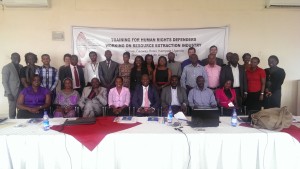
By Hassan Shire
Friends and colleagues,
It is a great pleasure to welcome you all here.
As you know, this workshop has been specifically designed for you as human rights defenders working within the extractives industry, and on other environmental issues that intersect with human rights.
You might validly ask why EHAHRDP, as an organization that works to protect HRDs at risk, is engaging on this topic.
Let me tell you a little of our history. From 2005 to 2007, in the first two years of our existence, we received very few requests for support from human rights defenders in Tanzania. Curious to find out why, in 2007 we commissioned a fact-finding mission to the country.
What we found on that mission has subsequently framed much of our work in Tanzania, and indeed across the region. We came into contact with a human rights movement that was focused on defending human rights in the context of mining, and oil exploration and production.
When we launched the Pan-African Human Rights Defenders Network, we defined five groups of human rights defenders at greatest risk across Africa. These groups include HRDs working on sexual orientation and gender identity issues, women HRDS, HRDs working in armed conflict environments, and journalists working to end impunity and high level-corruption.
The fifth group, we defined as environmental activists, including HRDs working on resource extraction issues.
Let me make a few general comments, before I hand over to my team, who have been preparing this workshop for over a year.
Human rights defenders who work on resource extraction issues operate at the new frontier of human rights. For many of you, your work touches upon contested issues to do with the environment, and land rights. Many of you will have come face to face with multi-national corporations and other powerful business interests who often have little regard for human rights. In some countries, such as in the Democratic Republic of Congo, we see instances of corporations engaging directly with militias so as to protect their economic interests.
Within this room, we have activists from across Kenya, Uganda and Tanzania- lawyers, researchers, field office coordinators, and campaigners working on a diverse range of issues. Collectively, your work includes research and advocacy, litigation, and grassroots outreach to indigenous communities affected by forced or negotiated resettlement. Some of you work to defend the rights of communities affected by private security agents contracted by resource extraction businesses.
Upholding economic environmental rights, or working as a human rights defender within the extractives sector, often involves opposing strong economic interests, including governments and multi-national corporations. These ‘interests’ are invariably highly organised, highly resourced, and attempts by HRDs to expose environmental concerns are often met with a sophisticated, and at time brutal, response. A number of you in this room have experienced this first hand.
The scale of these problems in this region is growing, and there is therefore a need to find nuanced and sophisticated methods of engaging with the scale of these challenges. This is where the skills we have developed in security management become crucial- and we hope that you will take on board some of the techniques that will be outlined over the next two days.
HRDs such as yourselves in this region, have been subject to some of the most acute risks, including physical and digital surveillance, harassment, threats, and serious physical attacks.
I am not the only person to have noticed this. The former UN Special Rapporteur on HRDs, Mme. Margaret Sekaggya, noted in 2007 that HRDs working on land rights and natural resources are the second largest group of defenders at risk of being killed. Last year, she noted that this trend had deteriorated during the course of her tenure.
The issue is also now under investigation by the Independent Expert on Human Rights and the environment, John Knox, and many of you in this room have engaged with him in Geneva.
Something else I have noted is the growing stigmatization of environmental HRDs, including being labeled ‘economic saboteurs‘ by governments, and being smeared and de-legitimized as HRDs. Last September, for example, the Ugandan government announced that it was investigating NGOs suspected to be involved in activities aimed at “undermining” Uganda’s burgeoning oil and gas industry.
At EHAHRDP, we continue to monitor and document risks facing environmental HRDs, as well as providing protection interventions and security management training where the need exists. We have also undertaken and published research into the scale of the challenges- In December 2012, we published, Only the Brave Talk About Oil, concerning risks facing environmental HRDs working in the resource extraction industries in Uganda and Tanzania. The report’s author, Neil Blazevic, will outline some of our key findings later.
The scale of the challenges you face is considerable, but so too is the importance of your work.
Over the course of the next two days, my team will be running sessions focused on security management, digital security, and advocacy, that I hope will strengthen your work, enhance your ability to work safely, and equip you with some creative ideas about how to advocate more effectively for change.
I also very much hope that many of you will have the chance to forge new contacts, partnerships, and alliances among yourselves over the next couple of days- to learn from each other, to share experiences, and best practices.
I wish you every success over the next two days.
Thank you very much.

